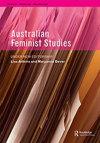“我在女性杂志上读到的最令人反感的观点”:女太监,情感(不)投资,以及麦考尔的读者作家
IF 1.5
4区 社会学
Q2 WOMENS STUDIES
引用次数: 2
摘要
1971年3月,美国女性杂志《McCall’s》刊登了杰曼·格里尔小说《女太监》的节选。在墨尔本大学的格里尔档案中,有无数写给编辑的未发表信件,这些信件显示,该杂志的读者基本上对格里尔的女权主义观点不屑一顾。这些读者作家,最好被定义为“反粉丝”,指责作者和编辑批评他们是妻子和母亲。通过对这些信件的分析,本文认为,这些信件的作者质疑格里尔作为第二波名人女权主义者的新兴权威,主要是通过将她病态化,援引关于女性特质的本质主义假设,并动员“选择”的话语,这些话语通常被理解为“后女权主义”代表性环境的产物。通过他们的反粉丝实践,他们挑战了格里尔剥夺家庭主妇代理权的企图,采用了既依赖又高度批评第二波女权主义的修辞策略。通过对女权主义的过去和后女权主义的现在进行复杂的主流描述,本文展示了名人女权主义者,包括“大片”作家,在历史上总是引起复杂的情感反应。本文章由计算机程序翻译,如有差异,请以英文原文为准。
‘The Most Revolting Ideas I’ve Read in a Woman’s Magazine’: The Female Eunuch, Affective (dis)investments, and McCall’s Reader-writers’
ABSTRACT In March 1971, American women’s magazine McCall’s published an extract of Germaine Greer’s The Female Eunuch. Myriad unpublished letters to the editor contained in the Greer archive at the University of Melbourne reveal that the magazine’s readers were largely dismissive of Greer’s feminist vision. These reader-writers, best conceptualised as ‘anti-fans’, took both author and editor to task for criticising them as wives and mothers. Through an analysis of these letters, this article argues that their authors contested Greer’s burgeoning authority as a second-wave celebrity feminist largely by pathologising her, invoking essentialist assumptions about femininity, and mobilising discourses of ‘choice’ more commonly understood as the product of a ‘postfeminist’ representational environment. Through their anti-fan practices, they challenge Greer’s attempts to deprive housewives of agency, deploying rhetorical strategies that are at once reliant upon and highly critical of second-wave feminism. By complicating dominant ways of framing the feminist past and the postfeminist present, this article demonstrates how celebrity feminists, including ‘blockbuster’ authors, have historically always elicited complex affective responses.
求助全文
通过发布文献求助,成功后即可免费获取论文全文。
去求助
来源期刊

Australian Feminist Studies
WOMENS STUDIES-
CiteScore
2.50
自引率
0.00%
发文量
7
期刊介绍:
Australian Feminist Studies was launched in the summer of 1985 by the Research Centre for Women"s Studies at the University of Adelaide. During the subsequent two decades it has become a leading journal of feminist studies. As an international, peer-reviewed journal, Australian Feminist Studies is proud to sustain a clear political commitment to feminist teaching, research and scholarship. The journal publishes articles of the highest calibre from all around the world, that contribute to current developments and issues across a spectrum of feminisms.
 求助内容:
求助内容: 应助结果提醒方式:
应助结果提醒方式:


